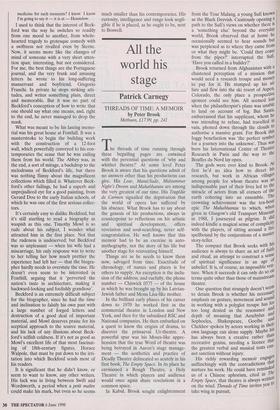All the world his stage
Patrick Carnegy
THREADS OF TIME: A MEMOIR he threads of time running through these beguiling pages are entwined with the perennial questions of 'why and whither theatre?' At some level Peter Brook is aware that his questions admit of no answers other than his productions can give. His Lear, MaratISade, Midsummer Night's Dream and Mahabharata are among the very greatest of our time. His Tragedie de Carmen signalled the deprivation that the world of opera has suffered by his absence. What Brook has to say about the genesis of his productions, always in counterpoint to reflections on his artistic and spiritual development, offers revelation and soul-searching, never self- congratulation. He well knows that this memoir had to be an exercise in auto- mythography, not the story of his life but another stage for reinventing himself.
Things are as he needs to know them now, salvaged from time. Exactitude of chronology, of names and places is for others to supply. An exception is the inclu- sion of the address, and ruefully, the phone number — Chiswick 0575 — of the house in which he was brought up by his Latvian- Jewish father and Mona Lisa-like mother.
In the brilliant early phases of his career down to 1970 he worked first in the commercial theatre in London and New York, and then for the subsidised RSC and National companies. He then embarked on a quest to know the origins of drama, to discover the primaeval Ur-theatre. A powerful spur was his Moses-like appre- hension that the true Word of theatre was being betrayed in Aaron's stage manage- ment — the aesthetics and practice of Deadly Theatre delineated so acutely in his first book, The Empty Space. In its place he envisioned a Rough Theatre, a Holy Theatre in which players and audience would once again share revelations in a common space.
In Kabul, Brook sought enlightenment from the Tour Malang, a young Sufi known as the Black Dervish. Cautiously opening path to the Sufi's views on whether there is a 'something else' beyond the everyday world, Brook observed that at home be occasionally seemed to hear sounds but was perplexed as to where they came from or what they might be. 'Could they come from the pipes?' interrupted the Sufi. 'Have you called in a builder?' Brook returned from Afghanistan with a chastened perception of a mission that would need a research troupe and meneY to pay for it. He stumped up his air fare and flew into the ski resort of Aspen, Colorado, the only place a prospective sponsor could see him. All seemed lost when the philanthropist's plane was unable to land on account of fog. But Santa, embarrassed that his supplicant, whom he was intending to refuse, had travelled 10 vain, phoned down through the clouds to authorise a massive grant. For Brook this foggy benefaction was the perfect symbol for a journey into the unknown'. Thus Was born his International Centre of Theatre Research in Paris and the way to the Bouffes du Nord lay open. The gods were ever kind to Brook. At first he'd no idea how to direct his research, but work in African villages among people for whom theatre was ail Indispensable part of their lives led to the miracle of actors from all corners of the earth cohering into an ensemble. The crowning achievement was the ten-bout epic The Mahabharata to which, when given in Glasgow's old Transport Muse in 1988, I journeyed as pilgrim. It chrl indeed kindle a magical sense of cornplicitY with the players, of sitting around a fire spellbound by the conjurations of a master story-teller. The compact that Brook seeks with his audience is always to share an act of faith and ritual, an attempt to construct a sense of spiritual significance in an age clf unbelief. It is, of course, an impossible yen" ture. When it succeeds it can only do so 00 terms quite other than those of mainstream theatre.
One question that strangely doesn't seem to detain Brook is whether his necessarY emphasis on gesture, movement and sound in working with a polyglot troupe has for too long denied us the resonance and, depth of meaning that Aeschylus Oat Sophocles, Shakespeare, Goethe an.° Chekhov spoken by actors working in thee own language can alone supply. Maybe Ms has always been a creative rather that' recreative genius, needing a licence that the greatest verbal and musical texts can- not sanction without injury. His richly rewarding memoir engages unflinchingly with the contradictions tbaAt nurture his work. He could have reiniricl„e' us of a Chinese aphorism, cited in Empty Space, that theatre is always written on the wind. Threads of Time invites you t° take wing in pursuit.


























































 Previous page
Previous page